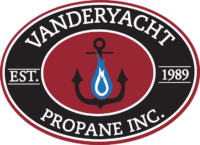PROPANE SAFETY GUIDELINES FOR THE HOME
- Propane leaks smell like rotten eggs. Educate your family so they may recognize the smell.
- If you smell a leak, evacuate the premises, and contact your local fire department, or propane supplier. When leaving the premises, do not alter any electrical outlets or light switches.
- Propane leak detectors are available at your local hardware stores.
- Know the layout of your gas services lines, especially if you are doing any type of landscaping or renovations.
- If you suspect your gas appliance has been damaged by water or flooding, have a trained technician come out and service your system.
- All furnaces should be cleaned regularly. Check with your propane retailer, and owners manual for cleaning instructions.
- In case of sediment buildup in your propane-fueled water heater, drain your tank until water runs clean.
- Have your range serviced if the flames are not blue? Yellow flames indicate blockage to the air inlets, or an adjustment may need to the burner. Contact a technician to service. Also, do not line your range with tin foil; it constricts air circulation.
- Never use a gas range or grill to heat your home.
SAFETY GUIDELINES FOR GRILLING
- Never contain grill in an enclosed space. Always use grills outdoors, in a well-ventilated area. Do not place grill near leaves, brush, or your home. Always keep the cylinders in an upright position. Never store spare gas containers under or near the grill.
- Always follow the owner’s manual, and keep it in a place that is easily accessible.
- Close the cylinder valve when it is not in use. Also, make sure all grill controls are in the off position. Never attach or disconnect a cylinder, or alter the cylinder fittings when the grill is in operation or if it is still hot.
- Do not cover your grill until all controls are turned off, and the grill has completely cooled down.
- Have all cylinders checked for dents, rust or leaks, when you are having it refilled?
- Never leave a filled cylinder enclosed in a vehicle. Keep your car well ventilated when transporting cylinders.
- Cover disconnected hose-end fittings and burner air intakes with protective fitting caps, when your grill is not in use. These caps keep dirt, moisture, and insects out of your equipment. Use a pipe cleaner or wire to clear the blockage in tubes that lead to the burner. Check grill hoses for deterioration and kinks in the tubing.
- Leak-detection solution can be purchased at your local propane gas supplier. Check for leaks, before igniting a grill burner. Also, check connections for tightness. Never use matches or lighters to check for leaks. Immediately turn off the gas and do not ignite, if you detect the pungent smell of propane gas.
- In case of an uncontrollable fire, call your local fire department immediately.
- Please refrain from smoking while handling your propane cylinder.
- Never allow children to tamper or play with your gas grill.
- Do not store where the cylinder would be exposed to high temperature. Move gas hoses far away from possible dripping hot grease.
- Check your owners manual if you have problems getting your grill to work. If you can not troubleshoot the problem, it is best to contact your local propane retailer.
- Call a certified technician if the burner flame is not blue. Yellow flames indicate that air inlets are obstructed or burners need to be adjusted.
- Keep pot handles turned inward, to avoid accidental spills, and to keep out of the reach of small children.
- Keep the grill and range surface clean and free of corrosion.
- Never cover the bottom with foil. The foil will restrict air circulation.
- Never use your grill as a space heater.
- Never leave cooking food unattended.
- Keep flammable material away from grill or burners.



